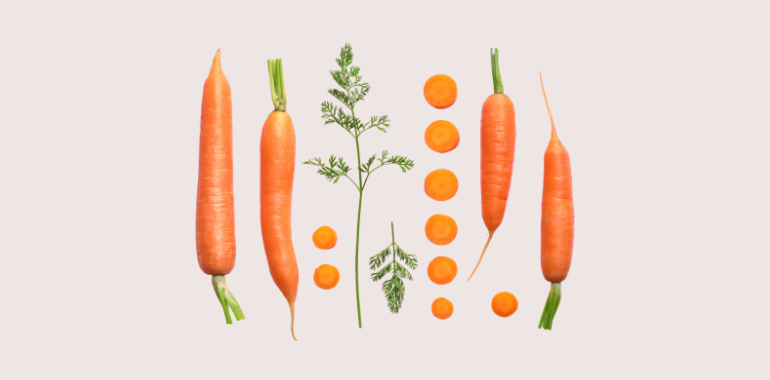Table Of Contents
Carrots and Diabetes: The Sweet Truth
Carrots have been a part of human diets for over 5,000 years, originally available only in purple and yellow varieties from the Middle East and Afghanistan. The familiar orange carrot didn’t appear until the 1600s. Today, these versatile root vegetables offer impressive nutritional benefits with their low-calorie and low-carb content. For people managing diabetes, carrots serve as an excellent alternative to higher-carbohydrate foods like potatoes or white rice.
Scientists continue to develop carrots in various colors including yellow, red, and dark orange, each containing beneficial pigments with significant health advantages. Rich in Vitamin A for vision health and packed with antioxidants and anti-inflammatory compounds, carrots make a nutritious addition to any meal plan—whether eaten raw, roasted, or incorporated into soups and salads.

What Makes Carrots a Nutritional Powerhouse?
The digestible portion of carrots contains approximately 10% carbohydrates, with water making up 86-95% of their composition. Carrots contain minimal protein and fat. Two small to medium-sized raw carrots (100 grams) provide:
- 41 calories
- 88% of water
- 0.9 grams of protein
- 9.6 grams of carbs
- 4.7 grams of sugar
- 2.8 grams of fiber
- 0.2 grams of fat
According to the USDA Nutrient Database, three medium-sized carrots contain an impressive 30,000 IUs of vitamin A, 60 milligrams of calcium, 586 milligrams of potassium, and 5 grams of dietary fiber. This represents six times the daily recommended amount of calcium and potassium. Carrots also provide vitamin C, magnesium, and phosphorus, making them truly nutritional powerhouses.
The Carrot Glycemic Index: Facts You Need to Know
The glycemic index (GI) system ranks foods based on how they affect blood sugar and insulin levels. Foods with a GI over 70 are “high GI” and likely to cause sharp blood sugar spikes. Conversely, foods with a GI under 55 are “low GI” and typically don’t significantly raise blood sugar levels.
Raw carrots have a remarkably low GI of just 16. Boiled carrots range between 32 and 49, still qualifying them as low-glycemic foods. Unlike many other foods, carrot GI can vary considerably. Oregon State University Extension reports that carrots have an average glycemic index score of 47 (plus or minus 16), placing them between 31 and 63.
Cooking and processing affect a food’s glycemic index. Cooked carrots have a GI of 39, while fresh 100% carrot juice has a slightly higher GI of 45. However, nutrition expert Jonny Bowden, Ph.D., emphasizes in his book “The 150 Healthiest Foods on Earth” that you shouldn’t avoid carrots based on glycemic index alone. The glycemic load provides a more meaningful indicator of how food affects blood sugar.
Carrots have a glycemic load of just 3, which Bowden describes as “ridiculously low.” This means they’re unlikely to significantly impact blood sugar levels. The high fiber content in carrots contributes to a slower rate of sugar release, giving them a lower glycemic index compared to other root vegetables like potatoes.
Do Carrots Spike Blood Sugar?
Carrots are often misunderstood as high-sugar foods that could spike blood glucose. Research shows that cooked carrots have a glycemic load (GL) of just 2. The GL value calculates how much a specific food will increase blood sugar levels after consumption. With their low GL of 2 and classification as non-starchy, high-fiber vegetables, carrots are safe for people with diabetes to consume in moderate amounts with meals.
Blood sugar (glucose) comes from the food we eat and provides energy for our bodies. However, uncontrolled blood sugar levels can worsen or contribute to type 2 diabetes. For those monitoring blood sugar, carrots represent a safe choice. The Glycemic Index Institute currently rates carrots at a GI of 41—a moderate level.
Earlier, less rigorous testing produced higher GI numbers for carrots, creating a misconception that people with diabetes should limit carrot consumption. This misunderstanding persisted partly because carrots have a naturally sweet flavor. Modern research has clarified that carrots have a modest impact on blood glucose when consumed in reasonable portions.

Benefits of Carrots for Diabetics
For people with diabetes looking for nutritious dietary options, carrots offer numerous benefits. As a non-starchy vegetable (like broccoli and cauliflower), carrots form an essential part of a balanced diet for those managing diabetes and everyone else. Let’s explore their specific advantages:
Fiber Content and Blood Sugar Management
Dietary fiber plays a crucial role in blood sugar management for people with diabetes. A comprehensive review of 16 meta-analyses found strong evidence that fiber intake may reduce the prevalence of type 2 diabetes. Consuming adequate fiber helps lower both long-term and fasting blood glucose levels in those with diabetes.
Diabetics are recommended to consume 20-35g of fiber daily from vegetables, fruits, and minimally processed grains. With 2.8g of dietary fiber per 100g, carrots contribute meaningfully to this important nutritional goal. The fiber in carrots slows digestion and helps prevent blood sugar spikes after meals.
Vitamin A’s Role in Glucose Control
A 2015 publication in Diabetes Management indicated that low vitamin A levels might independently serve as a risk factor for diabetes. This finding is particularly relevant for people with type 1 diabetes, where the body’s T lymphocytes target insulin-producing beta cells. Vitamin A is essential for pancreatic function and the development of these beta cells.
The vitamin also helps regulate immune processes like T-cell-mediated immunity, which may influence the development of type 1 diabetes. With 835 micrograms of vitamin A per 100g, carrots provide an excellent source of this crucial nutrient for blood glucose control.
Vitamin B-6 Support for Type 2 Diabetes
B vitamins play vital roles in various metabolic processes. Research has found that people with type 2 diabetes frequently have vitamin B-1 and B-6 deficiencies. Furthermore, low vitamin B-6 levels were linked to a higher incidence of early-onset diabetic nephropathy (kidney disease). This suggests that inadequate vitamin B-6 can significantly impact diabetes outcomes.
Carrots provide valuable B vitamins that can help address these common deficiencies in people with diabetes, potentially reducing complication risks and supporting overall metabolic health.
Potassium for Heart Health
Carrots contain significant potassium, which helps relax blood vessels and reduces the risk of cardiovascular disease and high blood pressure. A single medium-sized carrot provides about 4% of an adult’s daily potassium requirement. This benefit is particularly important for people with diabetes, who face elevated cardiovascular disease risks.
The fiber in carrots may also help lower levels of low-density lipoprotein (LDL or “bad” cholesterol), further protecting heart health. Since heart disease represents a major complication risk for those with diabetes, the cardiovascular benefits of carrots make them an excellent dietary choice.
Diabetes Management Benefits
Whether eaten raw or cooked, carrots maintain their low glycemic index rating, meaning they’re unlikely to cause blood sugar spikes. Using the GI index helps people with diabetes identify foods least likely to raise blood glucose levels. Rich in fiber, carrots are beneficial in preventing type 2 diabetes development and supporting weight management—both crucial factors in diabetes care.
The combination of low carbohydrate content, high fiber, and essential nutrients makes carrots an ideal vegetable for incorporation into diabetes-friendly meal plans. Their versatility allows for various preparation methods while maintaining their nutritional benefits.
Also, read – Why You Should Start Eating Vegetables For Breakfast
How Many Carrots Can a Diabetic Safely Consume?
The American Diabetes Association recommends that people with diabetes eat 2-3 servings of non-starchy vegetables daily. These vegetables include carrots, broccoli, spinach, and peppers. For carrots specifically, a serving size is typically 1/2 cup if cooked or 1 cup if raw.
This recommendation balances the nutritional benefits of carrots with careful carbohydrate management. Since the carbohydrate content in carrots is modest compared to many other foods, they can be incorporated into meals throughout the day without significantly impacting blood glucose levels when consumed in appropriate portions.
Individual tolerance varies, so I recommend monitoring blood glucose after introducing carrots to your diet. This personalized approach helps determine the optimal amount for your specific health needs and diabetes management goals.
Sugar Content in Carrots: What You Should Know
Carrots do contain carbohydrates, with nearly half of those carbohydrates being natural sugars. However, unlike added sugars in sweets and sodas, the sugar in carrots doesn’t significantly impact blood glucose. One large carrot provides fiber and approximately 400% of your daily recommended vitamin A alongside these natural sugars.
Carbohydrates primarily function as energy sources. They consist of sugar molecule chains—sugar and starch—that break down into simple glucose, the main energy source for your body’s cells, including your brain. When you consume more glucose than needed, some stores as glycogen in muscles and liver for immediate use when activity increases.
A large carrot contains 7 grams of total carbs (5% of the recommended daily intake of 130 grams). Simple carbohydrates with one or two molecules are classified as sugars. They enter the bloodstream quickly, providing energy while raising blood sugar levels. Sucrose (table sugar) comprises most of the sugar in carrots.
One large carrot contains just 3 grams of sugar. For context, 100 grams of raw carrots contain only 4.7 grams of sugar and 10 grams of carbohydrates total. This demonstrates that the natural sugars in carrots are minimal, making them suitable for people with diabetes despite misconceptions about their sweetness.
Raw vs. Cooked Carrots for Diabetes Management
Raw carrots offer an excellent choice for people with diabetes seeking healthy snacks. With just 5.7 grams of carbs per 1-cup serving, raw carrots provide a significantly lower carbohydrate option than most vegetables. Their high fiber content helps maintain blood sugar levels and promotes regular digestion.
Raw carrots also deliver substantial vitamin A, supporting eye health, infection prevention, and skin benefits. For those with diabetes or pre-diabetes, incorporating raw carrots into a low-carb meal plan makes nutritional sense.
Cooked carrots offer different benefits and versatility. They can be roasted with other vegetables, sautéed with minimal oil, or shredded with cheese or butter for a tasty side dish. Cooking methods like steaming, boiling, or roasting transform carrots’ texture and intensify their natural sweetness. They add rich flavor to hearty meals like stir-fries, chicken pot pies, and beef stews.
While cooking slightly increases the glycemic index of carrots (from 16 when raw to 39 when cooked), they remain in the low to moderate GI category. This means both raw and cooked carrots can be included in a diabetes-friendly diet, offering variety in texture, taste, and culinary applications.
Is Carrot Juice Good for Diabetes?
When considering if carrot juice is good for diabetes, several factors come into play. Fresh carrot juice has a glycemic index of 45, slightly higher than whole raw carrots (16) or cooked carrots (39). This increase occurs because juicing removes dietary fiber while concentrating the natural sugars.
The fiber in whole carrots plays a crucial role in slowing down sugar absorption, helping prevent blood glucose spikes. Without this fiber barrier, the natural sugars in carrot juice can enter the bloodstream more rapidly, potentially causing faster blood sugar elevation.
That said, carrot juice still offers valuable nutrients, including beta-carotene, potassium, and vitamins. For people with diabetes who enjoy carrot juice, I recommend consuming it in small quantities (4-6 ounces) alongside protein or healthy fats to moderate its glycemic impact. Alternatively, blending whole carrots rather than juicing them preserves the beneficial fiber.
Always monitor your blood glucose response when introducing carrot juice to your diet. Some individuals may tolerate it well, while others might experience unwanted blood sugar fluctuations. Your personal glucose response should guide your decision about including carrot juice in your diabetes management plan.
Beetroot and Carrot Juice: Benefits and Precautions
Beetroot and carrot juice combines two nutrient-dense vegetables into one beverage that offers both benefits and potential concerns for people with diabetes. This combination can be either beneficial or problematic depending on individual circumstances and diabetes management.
Research suggests that certain components in this juice blend may help diabetes management. Beetroot contains betaine, which can improve insulin sensitivity, while legume-derived insoluble fiber in both vegetables slows glucose absorption—both advantageous for blood sugar control.
However, juicing concentrates the natural sugars from both vegetables while removing most of the beneficial fiber. This concentration means beetroot and carrot juice should be consumed in moderate amounts alongside other foods, particularly complex carbohydrates, to minimize blood sugar fluctuations.
Before adding beetroot and carrot juice to your diet, consult with your healthcare provider. They can offer personalized guidance based on your specific health condition, diabetes type, medication regimen, and overall diabetes management goals. If approved, start with small portions and monitor your blood glucose response carefully.
Also, read – Oat Milk vs Almond Milk: Which is Better for Your Wellness
Potential Downsides of Carrots for Diabetics
Despite their many benefits, there are some potential drawbacks to consider when eating carrots with diabetes:
- While modest compared to many foods, carrots do contain natural sugars that need to be accounted for in carbohydrate counting.
- Some research suggests carrots may contain trace amounts of gamma-tocopherol and vitamin E, which might potentially increase type 2 diabetes risk. However, ongoing studies continue to evaluate carrots’ overall impact on diabetes management.
- Excessive carrot consumption could potentially lead to vitamin A overdose, particularly if vitamin A supplements are also being taken.
- Eating large quantities of carrots may result in carotenemia—a condition that gives the skin a yellowish tint. In some cases, very high carrot intake might also cause constipation.
These potential downsides primarily apply to excessive consumption. When eaten in moderate amounts as part of a balanced diet, carrots remain a nutritious choice for most people with diabetes. As with any dietary change, consult your healthcare provider if you have concerns about incorporating carrots into your diabetes management plan.
Best Ways to Include Carrots in a Diabetic Diet
Incorporating carrots into a diabetes-friendly diet can be both nutritious and delicious. Here are some of the best ways to enjoy carrots while managing blood sugar:
- Raw carrot sticks with protein: Pair raw carrot sticks with hummus, Greek yogurt dip, or a small handful of nuts to balance carbohydrates with protein and healthy fats.
- Roasted with olive oil: Roasting carrots with a drizzle of olive oil and herbs enhances flavor while adding healthy fats that help slow sugar absorption.
- Added to soups and stews: Incorporate diced carrots into broth-based soups with lean protein for a balanced meal that won’t spike blood sugar.
- Grated in salads: Add grated carrots to leafy green salads with vinaigrette dressing for extra nutrients without excessive carbs.
- Steamed as a side dish: Lightly steam carrots to preserve nutrients and serve as a low-carb side with protein-centered meals.
- Blended in smoothies: Add a small amount of carrot to green smoothies along with protein powder or Greek yogurt for balanced nutrition.
The key to successfully including carrots in a diabetic diet is portion control and balance. Aim for 1/2 cup of cooked carrots or 1 cup of raw carrots per serving, and pair them with proteins and healthy fats to create meals with a lower overall glycemic impact. Track your blood glucose response to determine your personal tolerance for carrots in various preparations.
When to Limit Carrot Consumption with Diabetes
While carrots generally fit well into a diabetes management plan, certain situations may call for limiting their consumption:
If you notice consistent blood sugar spikes after eating carrots, you might need to reduce portion sizes or change how you consume them. Some individuals have more sensitive glycemic responses than others, even to low-GI foods like carrots.
Carrot juice and other processed carrot products typically contain concentrated carbohydrates without the beneficial fiber of whole carrots. These should be limited or avoided if you struggle with blood sugar control.
During periods of poor glucose management or when adjusting medication, you might need to temporarily restrict even moderate-GI foods like carrots until stability returns. If you’re following a very low-carb diet approach to manage diabetes, you’ll need to count carrots toward your daily carb limit and adjust portions accordingly.
People with diabetic gastroparesis (delayed stomach emptying) sometimes find that high-fiber vegetables like carrots can worsen symptoms and may need to limit them based on individual tolerance. Always work with your healthcare provider to determine the right balance of foods for your specific health situation and diabetes management strategy.
Conclusion: Start Eating More Carrots Today to Improve Your Health
Carrots offer an impressive nutritional profile that makes them an excellent addition to a diabetes-friendly diet. With their low glycemic impact, high fiber content, and abundance of essential vitamins and minerals, they provide substantial health benefits without significantly affecting blood sugar levels when consumed appropriately.
Whether enjoyed raw as a crunchy snack, cooked as a flavorful side dish, or incorporated into various recipes, carrots offer versatility alongside their nutritional advantages. Their natural sweetness can help satisfy cravings while providing better nutritional value than processed sweet foods.
For people with diabetes, the key lies in mindful consumption—enjoying carrots in moderate portions as part of a balanced meal plan that considers total carbohydrate intake and individual glucose response. By incorporating this vibrant orange vegetable into your diet regularly, you can enhance your overall nutrition while supporting healthy blood sugar management.
My name is Barbara Kovalenko. I hold a Bachelor's degree in Human Nutrition from Bogomolets National Medical University in Ukraine and a Master's degree from Boston University in the United States. Over the past few years, I have gained valuable experience as a nutritionist and have since decided to share my knowledge and expertise with a wider audience. Currently, I am working as a nutritional consultant with the Lasta app.










I appreciate the reassurance that, despite their natural sugars, carrots can be a safe and nutritious choice for individuals with diabetes. Thank you!
Hello, Alex!
It’s great that you found the information helpful.😊